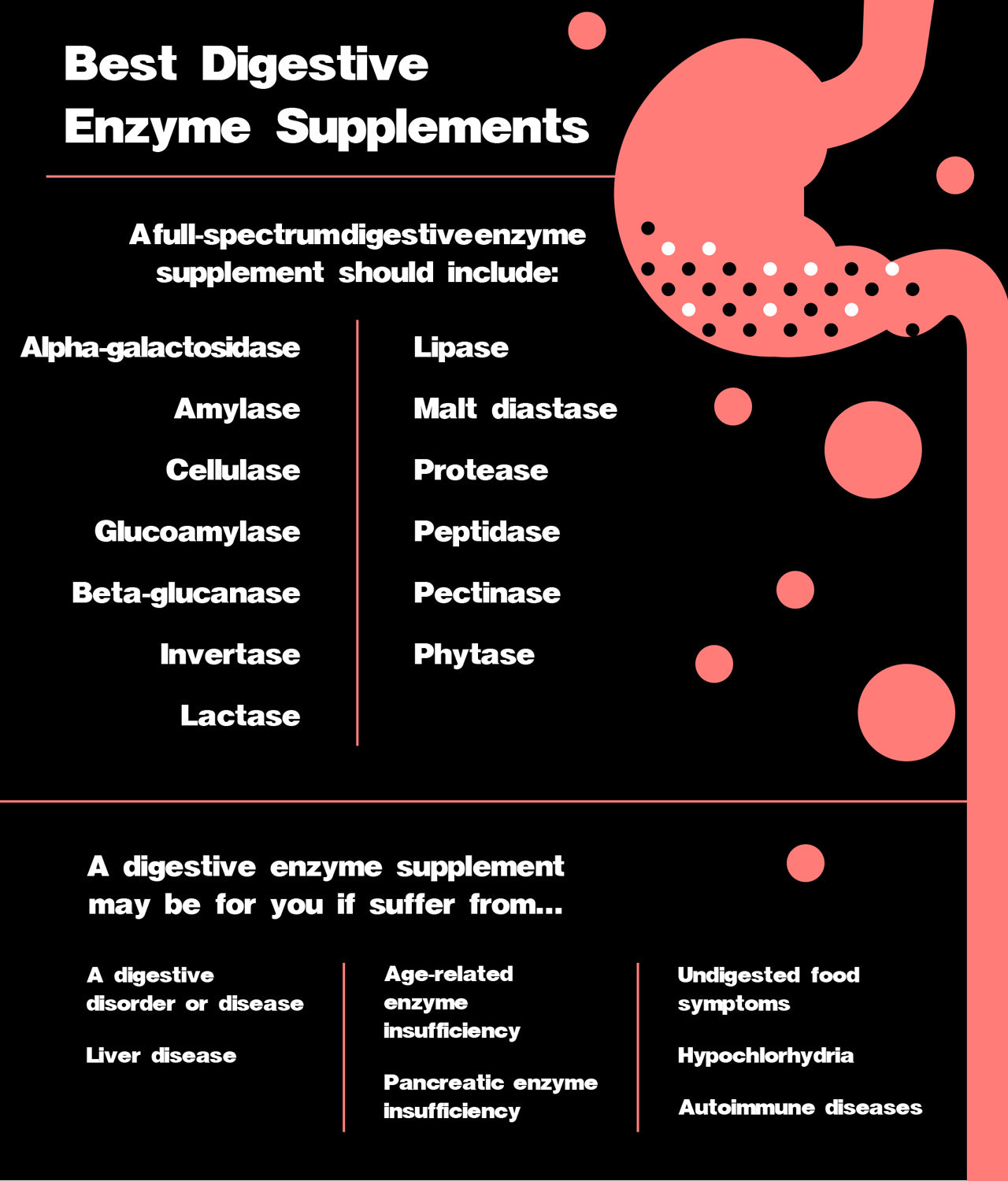Understanding Digestive Plant Enzymes and 6 Benefits Not to Miss
 By: by Amino Science
By: by Amino Science

If you are one of the millions of people that experience digestive distress, acid reflux, heartburn, or GERD, and you are considering adding digestive plant enzymes to your diet, keep reading. Across the globe, the incidences of gastrointestinal diseases are on the rise, particularly in North America.
And while researchers haven’t determined the exact cause of the increase in acid reflux, GERD, Crohn's disease, and other gastrointestinal problems, we can safely assume that the modern American diet is at least partly to blame. In fact, the World Health Organization estimates that somewhere between 13.8% and 25.8% of individuals in North America have GERD.
To combat heartburn, acid reflux, and GERD, people are turning to over-the-counter antacids at alarming rates. The World Health Organization estimates that more than $10 billion was spent worldwide on antacids in 2017. And antacids aren’t the only medication being used to fight poor digestion.
PPIs, or proton pump inhibitors, are a classification of medications that are used to treat GERD, gastric ulcers, and heartburn. They, too, are growing in popularity, and in the United States alone, in 2015, 117,617,849 prescriptions were written for PPIs including:
- Omeprazole
- Pantoprazole sodium
- Esomeprazole
- Lansoprazole
- Dexlansoprazole
Let’s look at the causes of heartburn. According to the Mayo Clinic, heartburn occurs when the acid in the stomach backs up, causing the burning sensation. They cite certain foods that can trigger symptoms for some people. These include:
- Spicy foods
- Onions
- Citrus fruits
- Tomato products
- Fried foods
- Chocolate
- Peppermint
- Fat-laden meals
- Carbonated beverages
- Alcoholic beverages
So, it seems natural that you would take something to fight the acid to prevent symptoms caused by poor digestion, but in the long run, doing so can cause more harm than good. The truth is, if you start to digest your foods fully, you may be able to avoid over-the-counter and prescription medications permanently.
Fortunately, there are effective natural treatments, including digestive plant enzymes, that can help to improve digestion, which, in turn, helps your body break down and absorb essential fats, proteins, minerals, vitamins, and carbohydrates.
So, What Are Digestive Enzymes?
Digestive enzymes are compounds used by the digestive system to break food down into absorbable particles. They are required for nutrient absorption. Some digestive enzymes are produced by the body, while other digestive enzymes need to be consumed.
There are three main classes of digestive enzymes:
- Amylase: Amylase enzymes are required for breaking carbohydrates down into an absorbable form. Amylase occurs naturally in saliva and pancreatic fluids and is activated when chewing begins to make digestion of carbohydrates easier. The best food sources for amylase digestive enzyme are ripe mangoes, corn, oats, wheat, and sweet potatoes.
- Protease: Protease enzymes are required for the digestion and absorption of proteins. They break down the proteins you consume and turn them into highly absorbable amino acids. Outside of the digestive tract, protease enzymes are associated with other vital functions, including tissue healing and energy. The best food sources for protease enzymes are pineapple, papaya, kiwi, ginger, and fermented foods.
- Lipases: Lipases enzymes are made and secreted by the pancreas. These digestive enzymes then mix with bile to spur the healthy digestion of fats and triglycerides into easily digestible fatty acids and glycerol. Lipases enzymes are used in the production of certain cheeses including provolone, Parmesan, and Romano, as they help the milk fat transform and add a distinctive flavor. The best food sources for lipase are ripe avocados, coconuts, walnuts, garbanzo beans, eggplant, and pine nuts.
NOTE: The plant-based digestive enzymes are most active when consumed raw.
Essential Digestive Enzymes
Within the three types of digestive enzymes mentioned above, there are some standout enzymes to get acquainted with.
- Actinidain: Actinidain is a protease enzyme that helps to digest proteins, including gluten, animal products, and legumes such as soy.
- Bromelain: This pineapple-based group of protease enzymes aid in the digestion and absorption of protein. They break protein down into amino acids, increasing their bioavailability.
- Cellulase: In order for our bodies to break down fiber found in vegetables, seeds, fruits, and grains, we need cellulase.
- Diastases: The diastases enzyme belongs to the amylase group. It is responsible for breaking down complex starches into maltose.
- Glucosidases: This is a subgroup of amylase that includes maltase, sucrase, glucoamylase, and dextranase. These digestive enzymes are responsible for transforming complex carbohydrates into the monosaccharide glucose. This is essential, as only monosaccharides can be absorbed into the bloodstream.
- Invertases: The invertases enzyme breaks down sucrose into glucose and fructose so they can be easily absorbed and utilized.
- Lactase: Lactase is arguably one of the most essential enzymes; our bodies need it to break down and absorb lactose from milk products. Individuals who are lactose intolerant may benefit from a lactase enzyme supplement.
- Papain: Papain is a protease enzyme that helps to break protein down into smaller protein known as polypeptides, and then into amino acids. It is readily found in the flesh of the papaya, as well as papaya leaves and stems.
- Pepsin: Found in the stomach, this proteases enzyme is responsible for breaking down proteins into polypeptides. In the study, “Reflux Revisited: Advancing the Role of Pepsin,” researchers identify pepsin as a critical element in the fight against GERD and acid reflux.
- Sucrase: Sucrose is broken down by the digestive enzyme sucrase into monosaccharides for easy absorption.
- Zingibain: Zingibain is a protease enzyme that helps proteins break down into amino acids. It also helps food move more quickly through the digestive tract.

6 Digestive Plant Enzyme Benefits
Thinking of upping your intake of digestive plant enzymes? Here are six reasons why that’s a good idea.
- Digestive enzymes break down foods that are difficult to digest, including dairy products, proteins, and high-fiber foods.
- Taking a digestive plant enzyme can help the digestion process and even relieve symptoms of certain digestive diseases such as Crohn's disease, irritable bowel syndrome, and GERD.
- Acid reflux and heartburn symptoms may be improved when digestive plant enzymes are added, as foods will be more thoroughly digested.
- Eating more raw foods known for their digestive plant enzymes can help enhance nutrient absorption and prevent nutritional deficiencies.
- Certain digestive enzyme supplements can help to counteract enzyme inhibitors commonly found in legumes, egg whites, wheat germ, white potatoes, and peanuts.
- Taking digestive enzyme supplements may allow you to stop taking prescription proton pump inhibitors (PPIs) and over-the-counter antacids.
Concerns of Proton Pump Inhibitors
In a report by the Mayo Clinic, “Proton Pump Inhibitors: Review of Emerging Concerns,” researchers point to several concerns related to the long-term use of PPIs. These concerns include:
- Vitamin B12 deficiency: In order for the body to release and absorb vitamin B12 from the foods we eat a certain amount of acid in the digestive tract is required. A study indicates that people who take PPIs for two years or longer are at a 65% increased risk of vitamin B12 deficiency.
- Hypomagnesemia: Extended use of PPIs can also adversely affect magnesium absorption. The Mayo Clinic cites that individuals who have taken PPIs for more than one year have a 43% increased risk of hypomagnesemia, a serious magnesium deficiency.
- Small intestine bacterial overgrowth (SIBO): Multiple studies link the use of proton pump inhibitors to small intestine bacterial overgrowth or SIBO. Researchers believe that a decrease in digestive acid can cause the growth of bacteria in the small intestine.
- Osteoporosis-related bone fractures: The researchers from the Mayo Clinic note that there is a concerning link between long-term use of PPIs and fracture risk. They note that some research indicates it is due to reduced calcium absorption.
- C. difficile infections: Multiple clinical studies suggest a link between the use of proton pump inhibitors and the development of C. difficile infections. The FDA issued a warning about the risk and recommended the lowest effective dose for the shortest duration to help protect against a dangerous C. difficile infection.
- Kidney disease: Multiple studies indicate that there is a 50% greater risk in developing chronic kidney disease in those who take PPIs.
- Dementia: Observational studies suggest that people who take PPIs are at a 38% increased risk for developing dementia, and a 44% increased risk of developing Alzheimer’s disease.

Who Should Take Digestive Plant Enzyme Supplements?
While we all need a healthy dose of daily digestive enzymes, we don’t all necessarily need to supplement with them. Certain conditions are, however, more likely to benefit from digestive plant enzyme supplements.
1. Digestive Disorders and Diseases
If you suffer from a digestive disorder you may find relief in symptoms from plant-based digestive enzymes, which can assist in the breakdown of challenging fats, carbohydrates, and proteins. Digestive conditions/diseases that may be aided by enzymes include:
- Lactose intolerance
- Crohn’s disease
- Celiac disease
- Irritable bowel syndrome
- Fecal incontinence
- Chronic gas
- Diverticulitis
- Diverticulosis
- Acid reflux
- Chronic heartburn
- GERD
2. Liver Disease
Individuals diagnosed with liver disease are at an increased risk of enzyme insufficiency and nutrient deficiencies since they cannot process and absorb foods properly.
3. Age-Related Enzyme Insufficiency
Seniors with age-related enzyme insufficiency may benefit from plant-based digestive enzyme supplements. As we age, our ability to make and release specific digestive enzymes decreases. For individuals with an increasing challenge of proper digestion or poor nutrient absorption, digestive enzyme supplements and foods rich in digestive enzymes may help to improve symptoms.
4. Pancreatic Enzyme Insufficiency
Individuals diagnosed with pancreatic conditions, including chronic pancreatitis and pancreatic cancer, may be supported by prescription-strength pancreatic enzyme medications.
5. Undigested Food Symptoms
Undigested food in the small intestine can cause a wide range of unpleasant and bothersome symptoms. Recognized symptoms include:
- Weight gain
- Thyroid problems
- Hair that is thinning or falling out
- Weak or cracked nails
- Arthritis or joint pain
- Chronic fatigue
- Depression
- Mood swings
- Fertility problems
- Constipation
- Diarrhea
- Insomnia
- Headaches or migraines
- ADHD
- Rashes or hives
- Severe PMS symptoms
- Hot flashes
6. Hypochlorhydria
This is a diagnosis that actually means you have too little gastric acids to help break foods down correctly. Hypochlorhydria can be caused by aging or by long-term use of antacids and proton pump inhibitors.
7. Autoimmune Diseases
Certain autoimmune diseases can cause poor digestion and poor nutrient absorption. These include:
- Rheumatoid arthritis
- Systemic lupus
- Erythematosus
- Sjogren’s syndrome
- Behcet’s disease
- Scleroderma (progressive systemic sclerosis)
- Kawasaki disease
- Polyarteritis nodosa
- Polymyositis
- Giant cell arteritis
- Henoch-Schonlein purpurn
- Cogan’s syndrome
- Churg-Strauss syndrome
- Wegener granulomatosis
- Antiphospholipid antibody syndrome
- Chronic inflammatory rheumatic diseases (spondyloarthropathies)

Plant Digestive Enzymes Side Effects
Most plant-based digestive enzymes are well-tolerated by most individuals. However mild to moderate side effects can occur including:
- Nausea
- Diarrhea
- Abdominal cramping
- Headaches
- Neck pain
- Congestion
- Swelling in the extremities
If you have been diagnosed with a latex allergy, it is imperative that you read the ingredient list of any plant-based digestive enzyme supplement carefully. Several foods that are known to cause latex allergy symptoms are also rich in digestive enzymes. These include:
Should you react negatively to digestive enzymes, considering supporting your health with a side-effect-free essential amino acid supplement.

Up to 25% off Amino
Shop NowTAGS: supplements
Join the Community
Comments (0)
Most Craveable Recipes




 833-264-6620
833-264-6620



















